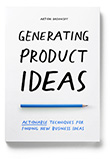The Story Behind The Book
For as long as I can remember, I’ve had ideas. I believe it started with seeing my parents’ hustles. Both were trained industrial designers, living in Belarus, where I was born. They had just launched their careers when the USSR fell apart, at the beginning of the 90s. Industry collapsed and there was nothing for them to design anymore. My parents suddenly had to find creative ways to make a living for themselves and to provide for their newborn — me.
During these years I saw my parents doing many things — importing dolls from China and clothes from Turkey, making smoked pork and horseradish for local food markets, designing bottle labels for local alcohol producers (the only industry that was still going strong, for tragic reasons), producing wooden souvenirs, the list goes on.
These hustles were not a choice but a necessity for my parents, to make ends meet; but I believe that seeing them working on such a wide variety of things formed my “you can build anything” mindset. I soon started venturing into entrepreneurialism myself and, at the age of 15, I was already running multiple side hustles: selling pirated movies (I’m not sure you could buy unpirated content in Belarus until recently!), writing for local newspapers about technology and computer games, and self-publishing a paid-for student publication for classmates and teachers at my school.
When I was 16, I moved to Israel. Without realizing it back then, I was moving to one of the most innovative countries in the world. With a population of just nine million people, Israel has the third most companies on the NASDAQ, after the US and China. They are also number one in the world for venture capital invested per capita, and research and development spending per capita. Moving to this environment and being surrounded by innovation has probably impacted my professional life more than anything else. I skipped college and kept building websites and, later, designing products. I worked as a freelancer, a full-time employee in tech companies, an agency owner, and a tech-product company co-founder.
Two years ago, after almost a decade of rich and varied experience, I realized that I most enjoyed working on my own projects. I took a leap and decided to go back to the same things I loved to do when I was 14 — building things I believed should exist. Now I’m creating digital, physical, and content products. From some I can make a living, others were a complete failure.
My ability to generate ideas fluctuates over time but, two years ago, I felt like I arrived at a tipping point when the list of ideas I wanted to pursue became much longer than the time or resources I had.
I never consciously worked on getting better at generating ideas, so I became curious about this shift from having some ideas to having many ideas. I started observing the thought processes that led me to new ideas during the years and noticed patterns. Based on these, I created a framework to support idea generation and started using it myself. At some point, I realized that these techniques could benefit others too.
“Ideas are cheap, execution is everything,” says Chris Sacca, an investor in Twitter and Uber. The startup industry is living by this mantra, and there is some truth to it. However, execution without ideas or of bad ideas won’t get you very far. You have to have ideas to build a business.
Today you can learn any execution-related skill online: coding, design, marketing, distribution, and sales. When building a business, ideas are multipliers of the effort that is put into the execution. But how many resources do you know of that teach us how to come up with business ideas? There are some ideation methodologies like design thinking, but they only provide a method and not the inputs to feed into this method, which means they’re not very actionable. In my research, I was surprised to find no consolidated and solid resource providing specific and practical advice on generating product ideas.
With this book, I want to fill this gap and allow everyone to learn how to generate ideas. I hope it will help more people to start a business and solve the most urgent problems the world is facing today, making it more sustainable, healthy, and equal.

Generating Product Ideas
A highly practical book for finding ideas for your next business, indie startup or a weekend project.